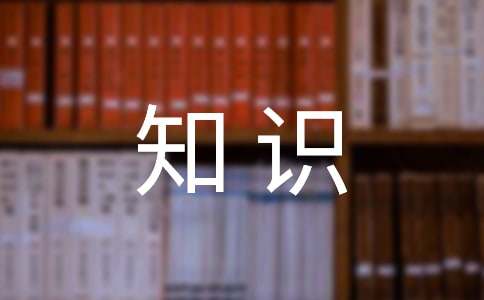- 相关推荐
初三英语一般现在时知识点
一般现在时用于表示经常性或习惯性的动作或存在的状态。下面是小编为大家整理的初三英语一般现在时知识点的相关内容,希望大家喜欢。

初三英语一般现在时知识点整理
其动词形式是:动词原形(只有第三人称单数作主语时除外,要加-s)其疑问句和否定句需要用助动词do或does
1) 肯定句用行为动词原形表示
They get up very early every morning. 他们每天早晨起来很早。
I visit my grandparents four times a month. 我一个月去看望祖父母四次。
2) 否定句用don’t + 动词原形来表示
We do not go shopping on Sundays. 我们周日不去购物。
I don’t think you like this colour. 我想你不喜欢这个颜色。
3) 一般疑问句则是把助动词do提前至句首,后面动词用原形。回答时,肯定用 “Yes, 主语+do”;否定句用 “No, 主语+don’t”。
–Do they go to school at seven o’clock? 他们七点去上学吗?
--Yes, they do.
--Do you like this skirt? 你喜欢这条裙子吗?
--No, I don’t. 不,我不喜欢。
一般现在时用来表示经常的'或习惯性的动作,常与以下的时间状语连用:often 经常,always 总是,sometimes 有时,usually 通常,every day/ week 每天/ 周等。
He usually goes to school by bike. 通常他骑车上学。
I visit my grandparents every week. 我每个星期都去看祖父母。
She is always late for class. 她总是上课迟到。
My parents and I sometimes go out to eat. 我和父母有时出去吃饭。
It often rains here. 这儿常常下雨。
主语为第三人称单数时的一般现在时
一般现在时态,当主语为第三人称单数时,谓语动词也要是第三人称单数,后要加-s或-es。
He likes reading at night. 他喜欢夜里读书。
She usually goes to school by bike. 她平时骑车上学。
The little cat drinks milk every day. 小猫每天都喝牛奶。
转换成否定句要加doesn’t,其后的动词用原形。
Kelly doesn’t get up early on Saturdays and Sundays. 凯丽星期六星期天起床不早。
He doesn’t feel well today. 他今天感觉不舒服。
转换成一般疑问句,句首用Does,其后的动词用原形。
Does he have lunch at school? 他在学校吃午饭吗?
Does it take long by train? 乘火车要很长时间吗?
初三英语一般现在时用法
一般现在时表示经常性或习惯性的动作,常与表示频度的时间状语every day, usually, always, often, sometimes, on Sunday等连用。如:
I go to school at 6 every morning. 每天早上我七点去上学。
一般现在时表示客观存在及普遍真理。如:
Summer follows spring. 春天之后是夏天。
The sun rises in the east. 太阳从东方升起。
注意:此种用法即使出现在过去的语境中,仍用一般现在时。如:
I learned that the earth goes around the sun when I was in primary school. 我在小学就学过地球是围绕太阳转的。
一般现在时表示格言或警句。如:
Pride goes before a fall. 骄者必败。
一般现在时表示目前的情况或状态。如:
I am a teacher. 我是教师。
Peter writes good Chinese but does not speak well. 彼得汉语写得不错,讲的可不行。
以here, there等开始的倒装句,表示动作正在进行。如:
Here comes the bus. = The bus is coming. 车来了。
There goes the bell. = The bell is ringing. 铃响了。
在下列情况下表示将来:
1. 在状语从句中用一般现在时代替一般将来时。如:
I will give it to him as soon as I see him. 我一看见他就交给他。
He will come if you invite him. 如果你请他,他会来的。
Suppose he doesn’t agree,what shall we do?假如他不同意,那怎么办?
I shall do as I please. 我高兴怎么做就怎么做。
He will continue the work no matter what happens. 不管发生什么情况他都要继续这项工作。
2. 在the more…the more …(越……越……) 句型中,前者通常用一般现在时代替一般将来时,因为前者相当于条件状语从句。如:
The harder you study, the better results you will get. 你学习越努力,成绩就会越好。
3. 在make sure (certain) , see to it, mind, care, matter后的宾语从句的谓语动词用一般现在时代替一般将来时。如:
See to it that you are not late again. 注意别再迟到了。
4. 表示按计划或时间表将要发生的动作,通常有表示将来的时间状语。如:
The plane takes off at 11:30 and arrives in Shanghai at l:20. 飞机十一点半起飞,一点二十分抵达上海。
注:只限于少数动词能这样用,如 begin, start, , end, finish, stop, go, come, leave, sail, arrive, return, close, open 等。
【初三英语一般现在时知识点】相关文章:
初三英语的知识点总结07-17
小学生英语单词知识点:一般现在时10-10
初三英语必备的语法知识点01-27
初三英语知识点:定语从句06-23
句子种类初三英语知识点07-10
初三英语上册词汇知识点07-01
初三英语名词的分类知识点07-17
最新初三英语知识点总结07-28
关于初三英语知识点的用法07-26